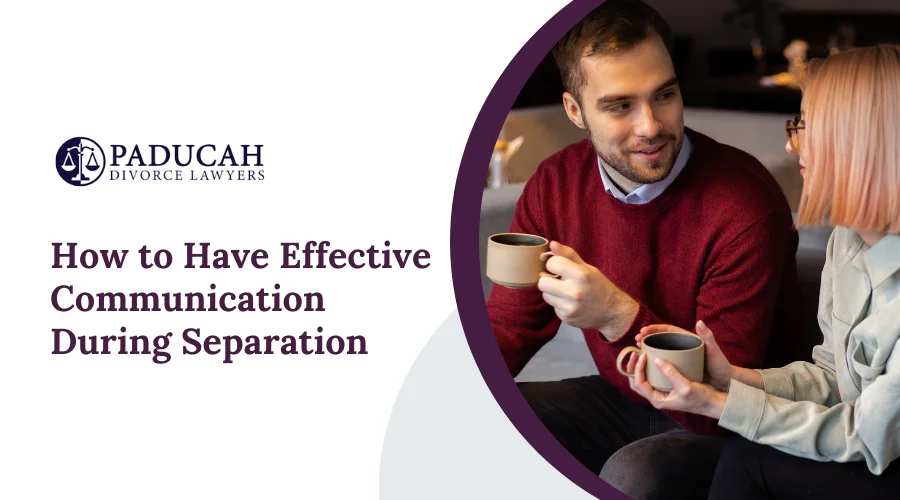Going through a separation is hard, especially when there are kids. One really important thing is talking and listening to each other, especially for parents and foster parents. This blog post is here to help you understand how to communicate during separation.
We’ll give you tips and ideas to ensure everyone stays connected and feels good. We know it’s a tough time emotionally, so our goal is to guide you with helpful advice. We want to show you how important it is to talk nicely and be strong and caring as you go through this tricky situation. Immerse yourself in the details of our legal services by scheduling a complimentary initial consultation with the Paducah Divorce Lawyer.
Communicating with Children About Separation
Initiating a conversation about separation with children demands sensitivity and honesty. It is essential to use age-appropriate language and assure them of your continued love and support. Establish an open dialogue, allowing them to express their feelings and concerns.
Connecting with Your Foster Child
Foster kids might find separation extra tough. The most important thing is building trust. Make a safe space for them to share feelings. Consistent, patient, and active listening are essential for a strong connection.
Building an Emotional Connection
Create a deep emotional bond by doing things your foster child likes. Shared experiences make the bond stronger, giving a sense of stability in difficult times.
Children’s Responses and Adjustment to Parental Separation
Kids react differently based on age and feelings. Understand and validate their emotions. Even after separation, parents being united can make them feel more stable.
Initial Responses of Children at Different Ages
Infants, toddlers, school-age kids, and teens react uniquely to separation. Adjust how you talk to them based on their age. Be ready for questions at different times.
Children’s Responses to Further Transition and Change
More changes may happen after separation. Keep talking to the kids and have a routine to help them adjust. Be flexible and understand their changing needs.
Children’s Long-Term Adjustment
Kids need support for a long time after separation. Keep talking, promote healthy coping, and seek professional help if needed.
Custodial Parent’s Adjustment
The parent taking care of the child is crucial post-separation. Take care of yourself, get support, and show good ways to cope in a positive environment.
Access to the Non-Residential Parent
Make sure the child spends time with the non-residential parent. Regular visits, talking, and involvement in the child’s life make them feel safe.
Post-Separation Conflict
Reduce fights for the child’s sake. Communicate, set boundaries, and focus on what’s best for the child to avoid conflicts.
Tips for Communication During Separation
The delicate process of communication during separation requires a thoughtful approach. Here are essential tips to help guide parents and foster parents through this challenging journey:
- Be Honest but Age-Appropriate: When you talk to your child, use words they can understand. Be truthful about the changes without telling them too much. Reassure them and explain things in a way that makes sense to them.
- Prioritize Active Listening: Listen carefully when your child talks about their feelings. Make them feel heard and understood. Don’t interrupt them; let them express themselves freely.
- Maintain Consistency in Communication: Keep in touch with your child regularly. Have a routine for calls, visits, or messages. Having a predictable schedule helps them feel more secure and less worried.
- Encourage Open Expression of Emotions: Tell your child it’s okay to share how they feel. Please encourage them to talk about their emotions without judging them. Let them know that expressing feelings is important and helps them understand their emotions.
- Seek Professional Guidance When Needed: If things get tough, it’s okay to ask for help from professionals like counselors or therapists. Speaking with a helpful person can make things easier for you and your child.
- Create a Supportive Network: Be around friends, family, or groups who can offer support. Share your experiences and get advice from others who’ve been through similar situations. Having people around you can provide emotional help and practical tips.
- Establish Boundaries for Co-Parenting: If you’re co-parenting, set clear and respectful rules with the other parent. Communicate effectively to make things stable for your child. Define roles, responsibilities, and expectations to avoid confusion.
- Celebrate Milestones Together: Even after separation, celebrate important moments as a family. Attend events, birthdays, and special occasions together. Sharing positive experiences helps your child feel together and shows that parents can still cooperate.
- Be Patient and Adaptive: Understand that adjusting takes time. Be patient with yourself and your child as things change. Stay flexible and face challenges with a mindset focused on learning and growing.
- Foster a Positive Co-Parenting Dynamic: Try to have a positive relationship with the other parent. Focus on what’s best for your child. Keep communication open, working together for your child’s well-being. Collaborative parenting, even after separation, can help your child adjust positively.
Good communication when families go through changes is super important. It helps make the family strong and able to handle tough times. When parents or foster parents talk openly, understand what each kid needs, and deal with problems kindly, it builds a good environment for the family.
It’s essential to care about each other’s feelings and provide a location where everyone can express themselves. The main idea is that if everyone talks and listens nicely, it improves the family and helps everyone feel supported and happy.
Read this other article Review and Modification Process: Adapting to Evolving Needs in Parental Planning






